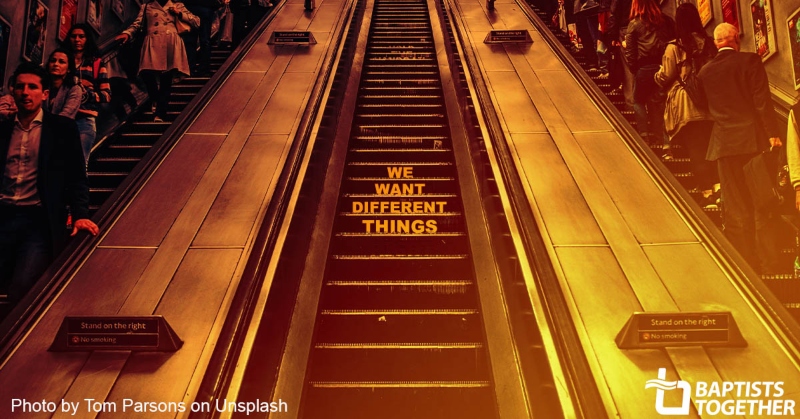We want different things
Why we have to form churches that are not based on what Christians like, but on what non-Christians need the church to be. By Michael Shaw

It was their regular argument, and was happening more and more. 'You're just no fun anymore, all you want to do is stay in with a glass of red wine and watch a film. You only want to settle down, have a family, get a dog.
'I have a few more years of partying with my mates left in me. I am 25, not 55!'
Then came the killer blow. 'We want different things, we are just no longer compatible.'
With that, she walked out slamming the door. He poured another glass of red wine and turned the TV on to watch Long Lost Family. Within a week she had moved out for good.
We want different things is often the reason for most relationship breakdowns, but I think it is significant in how we understand how we as a church try to speak into a culture that wants different things.
Paul was not only the first great theologian of the church, but also both the first great missionary and the first great church planter of the church. The one thing Paul knew was how to move to culture and make the church compatible. He knew the Gentile world wanted different things from his Jewish upbringing, probably because he was a Jew from Tarsus and not Jerusalem.
This is a skill the church has lost. I grew up in a non-Christian household but found God at my school Christian Union. The church where I trained to be a minister found me very odd, in that I knew none of the old choruses that they grew up with, had never watched an episode of Veggie Tales and had never been to Soul Survivor with my youth group. I had very little of that baggage.
Like it or not, the upbringing of most Christian kids is fundamentally different to their non-Christian peers. This causes us a missional problem, because although they speak they same as their friends, watch many of the same TV programmes or play the same video games, what they are looking for in church is fundamentally different from what people outside the sub-culture would want from church.
But there is another major problem. Not only are they often growing up in a different culture from their peers, they are more often than not growing up in a middles class, aspirational culture. This means they are removed from their friends by the church culture and removed from their poorest by their class culture.
So why is this a problem? It's a problem because what they think is going to “attract” people to church, what they enjoy, is fundamentally different from what their peers would want, and a world away from the millions of children who they are separated from by their class.
Consequently, while the idea of a great worship leader and good solid biblical teaching might attract them, it will not attract their friends. It certainly won't be something people will travel across the city to. More and more of our churches are based on a model of a cool worship band, and a cool pastor with lattes served at the end. While this will and does attract those of a Christian upbringing, only in very rare cases will anyone from outside that culture find this an attractive proposition.
Put simply, they want different things.
They have different questions, they have different problems, they have different needs, and they will not go to church for the same reasons. Instead, the church has to speak to them in their language, has to get rid of their assumptions of what they want or need, and has to serve them in their communities. Paul realised very quickly realised the church has to go to them. I believe we have to form churches not based on what Christians like, but on what non-Christians need the church to be.
Until we do this, then the church will continue to decline. It is already fairly non-existent in many inner-city communities, and this will spread further and further into the suburban communities. We need to equip our young people to be missionaries, to be sent into not just their familiar communities, but also into unfamiliar communities if the church is going to grow, or even survive into the next generation.
Agree? Disagree? Share your thoughts via our letters' page.
Baptist Times, 08/01/2020